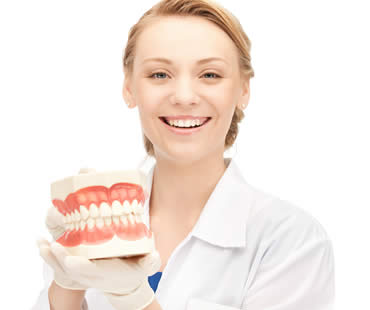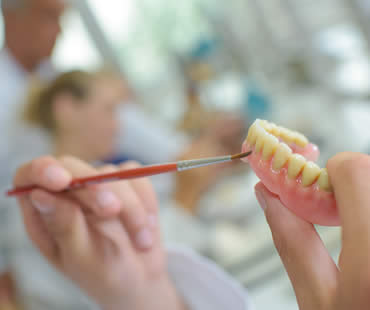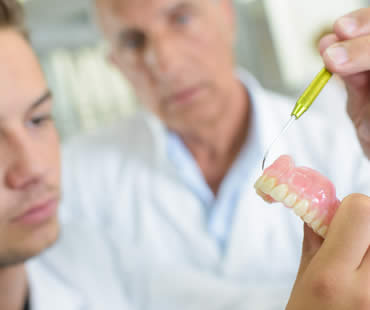
Jun 12, 2020 | Dental Topics 2, Dentures, Blog
If your teeth are badly damaged from decay or facial trauma, or if you have several missing teeth, your dentist may recommend removable prosthodontics to solve your dental problems. Periodontitis (advanced gum disease), bone loss or serious tooth decay can leave you as a poor candidate for restorative options such as dental crowns, dental bridges or dental implants. Removable prosthodontics can restore your smile so that it looks and functions as it should and can restore your confidence as you eat, smile and laugh.
Just hearing the word “dentures” might give you pause, reminding you of your older relatives, but achievements in dental restorative therapies enable your dentist to craft a removable prosthodontic for you that will not only look, but will feel like your natural smile.
Removable prosthodontics include:
- Partial dentures correct gaps when only a few of your natural teeth are missing. A partial denture may be the best choice if your remaining teeth aren’t strong enough to support a dental bridge.
- Overdentures provide restorations when one or more of your natural teeth are in place in an arch – typically two teeth for a bottom overdenture and four teeth for an upper overdenture.
- Immediate dentures are put in place following an extraction, allowing the bone and gums to recover following an extraction procedure. They prevent the adjacent teeth from collapsing upon the empty space and affecting your bite.
- Complete dentures are for edentulous patients (patients with no teeth at all) and are designed to replace all of the teeth in one or both arches of your mouth, restoring your smile and your ability to eat and speak clearly.
Because of advancements in materials and techniques, many dentures can be mistaken for natural teeth. Only you – and your prosthodontist – will know your secret. Talk to your prosthodontist today to see what removable prosthodontics can do for you. Don’t wait to begin enjoying your life with your new, healthy smile.
If you need a dentist in Conyers contact us today

Jan 15, 2021 | Dental Topics 2, Dentures, Blog
Thanks to advances in dental technology, dentures are more natural looking and comfortable than ever before. If you are one of the many adults wearing dentures to replace missing teeth, there are several do’s and don’ts you will want to follow to ensure they maintain their fit and your oral health:
- Do take your dentures out before going to bed, allowing your mouth tissues to rest from wearing them all day.
- Don’t let your dentures dry out. Soak them in mild denture solution or water while you sleep.
- Do clean them daily with either a mild detergent or special denture cleaning solution and a soft-bristled brush.
- Don’t soak them in very hot water, as this could cause them to warp, and they will no longer fit properly.
- Do handle them with care. Dropping your dentures or treating them with strong cleansers or harsh brushes can do permanent damage.
- Don’t neglect your oral care for the rest of your mouth. Even patients with a full set of dentures need to take care of their gums, and if you have partial dentures you should continue to brush and floss your remaining teeth regularly.
- Do pay attention to changes in the fit or feel of your dentures. Problems with fit can lead to irritation and discomfort, and could also be an indication of gum disease.
- Don’t try to adjust or repair your dentures on your own. If your dentures are ill-fitting or damaged in any way, schedule an appointment with your dentist to have them evaluated.
- Do continue to see your dentist for regular checkups to help maintain your best oral health and check your dentures for fit and function.
If you are missing all or some of your teeth, dentures can greatly improve both your appearance and the quality of your life. By following these simple guidelines, you can maintain the beauty and functionality of your dentures for many years.
If you live in the Conyers area contact us today

Jul 13, 2018 | Dental Topics 2, Dentures, Blog
An implant overdenture combines the use of traditional dentures and implant technology to create a denture that fits over your remaining natural tooth roots or dental implants. These root or implant supported dentures are held in place by dental attachments which provide excellent stability and support for your dentures. Overdentures were developed to help patients missing some or all of their teeth regain a quality of life that may have been lacking since they lost their teeth.
There are several benefits to implant overdentures when compared to traditional dentures:
- Saving your natural roots or having implants placed slows bone loss by stimulating the bone in your jaw when you eat or chew.
- Because overdentures are better fitting by design, they are more stable and allow you to chew food more thoroughly. This promotes better digestion and allows you to absorb more nutrients.
- The increased stability provided by overdentures also means you are able to speak more clearly, as there is no slipping or clicking of your dentures.
- Loose dentures are not a worry with overdentures. Sticky adhesives and messy denture creams are unnecessary when you have implant overdentures.
- With overdentures, the natural shrinkage that occurs from an under-stimulated jaw does not occur. This keeps your face from looking sunken, as can often happen with traditional dentures.
To find out if you are a candidate for implant overdentures, schedule an evaluation by your dental professional. Overdentures could be the best, most natural treatment for restoring your oral health and beautiful smile.
We look forward to seeing you in our Conyers dental office

Nov 7, 2024 | Family Dentistry, Dental Topics 2, Blog
Proper dental care and oral health should start early in life. Because children’s needs and dental procedures are different than those of adults, it’s important to find a family dental practice that can meet the needs of even the youngest members of your family. Your child’s first dental checkup should take place before the age of one, as soon as the first tooth has erupted. Some of the pediatric dental care options to look for in a family dental practice include:
- Child specific dental health exams and risk assessment
- Preventative oral care including cleanings, sealants, and fluoride treatments
- Care for dental trauma such as fractured, displaced or knocked-out teeth
- Treatment of dental cavities and defects
- Identification and treatment of gum inflammation and disease
- Early assessment, treatment, and recommendations for misaligned teeth or an improper bite
Along with the proper pediatric training, it’s essential that your family dentist is equipped to make your child feel comfortable and relaxed at dental visits. Many practices offer child-friendly amenities such as game rooms, videos, and prizes and rewards for completing a successful visit. Ask your family dentist if they allow parents to accompany children in the treatment room, as this will put both you and your child at ease.
To ensure a lifetime of excellent oral health, your child should visit the dentist every six months for dental cleanings and checkups. Children are not born with a fear of the dentist, and with the right family dental practice they should never have to develop that fear. Take the time to find a family dental practice that understands the special attention required to treat children so your entire family can enjoy visiting the dentist.
If you need a dentist in Conyers contact us today

Dec 7, 2023 | Family Dentistry, Dental Topics 2, Blog
Do you have children? Are you exhausted from driving all over town for clubs and meetings and appointments for your family? If you are finding yourself occasionally overwhelmed by the needs of your family, a family dentist can help you simplify one area of your life. A family dentist can see each member of your family, from the youngest to the oldest, sometimes on the same day in the same block of time!
Because of the rising popularity of family dental practices, you have more choices than ever to address the oral health needs of your entire family. Choosing the right one can be difficult and confusing. If you’re looking for a new family dentist, here are some factors you can consider when you’re choosing which family dental practice in your area is for you:
- How much training does this dentist have? How long has he or she been in business? All dentists must graduate from dental college, but a truly exceptional dentist will pursue continuing education courses in an effort to stay abreast of the latest methods and technology in their field. Ask what current certifications the dentist holds. How experienced is their staff?
- Are the employees and the dentist good with children? When you visit their offices, do you see an environment that’s inviting and warm? Are there games or activities for children of all ages? Are the magazines you see appropriate for all ages? Do the patients in the waiting area seem comfortable and relaxed? Does everyone you see seem happy? Did the front office staff greet you in a friendly manner? If any of the answers is no, then you should look at the practice more closely before you make an appointment.
- How modern is the office? A good family dentist will have current technology and sedation dentistry options to ensure a pleasant visit for all.
Choosing a family dentist is an important step. Don’t rush into it; do some research before you decide, and you can ensure that you make the best choice for your family.
We look forward to seeing you in our Conyers dental office

May 10, 2019 | Dental Topics 2, General Dentistry, Blog
One of the greatest gifts you can give yourself is taking care of your oral health throughout your life. Practicing a consistent dental hygiene routine and maintaining regular visits to your general dentist are the best ways to increase your chances of a beautiful, healthy smile.
General dentists focus on preventive care and treating minor problems before they have a chance to worsen into serious issues. Even if you regularly brush and floss your teeth, plaque and tartar can be quick to develop. A dentist has the necessary tools and training to remove damaging deposits before they harm your smile. In addition to professional cleanings and examinations, most general dentists fill cavities, perform root canals, whiten teeth, and even offer additional cosmetic dental procedures like dental implants or veneers.
One of the main reasons for routine examinations is to identify various problems. One common issue that you want your general dentist to catch early is gum disease. When it is treated soon after it starts, you are more likely to avoid bone deterioration or tooth loss. The early stage of gum disease is called gingivitis and can be handled by your dentist with simple techniques. If it advances to periodontitis, that’s when bone or tooth loss become a possibility and more invasive procedures like scaling or root planing may be required.
Once you make your dental appointment, which is typically recommended every six months, make sure you keep your scheduled visit. Many patients fall victim to scheduling appointments and then cancelling, not realizing how important seeing your general dentist can be. If you have dental insurance, you can even use your dental benefits for examinations and treatments. This office accepts Blue Cross/Blue Shield of Louisiana, MetLife, and Cigna.
Choose a qualified general dentist and establish a long-term relationship now, so that you can enjoy your healthy and appealing smile for years to come.
We look forward to seeing you in our Conyers dental office








